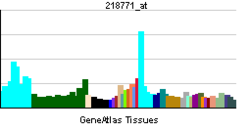- PANK4
-
Pantothenate kinase 4 Identifiers Symbols PANK4; DKFZp547M242; FLJ10782 External IDs OMIM: 606162 MGI: 2387466 HomoloGene: 41235 GeneCards: PANK4 Gene EC number 2.7.1.33 Gene Ontology Molecular function • nucleotide binding
• pantothenate kinase activity
• ATP binding
• transferase activityCellular component • cytoplasm Biological process • coenzyme A biosynthetic process Sources: Amigo / QuickGO RNA expression pattern 
More reference expression data Orthologs Species Human Mouse Entrez 55229 269614 Ensembl ENSG00000157881 ENSMUSG00000029056 UniProt Q9NVE7 Q05CZ0 RefSeq (mRNA) NM_018216 NM_172990.4 RefSeq (protein) NP_060686 NP_766578.2 Location (UCSC) Chr 1:
2.44 – 2.46 MbChr 4:
154.34 – 154.36 MbPubMed search [1] [2] Pantothenate kinase 4 is an enzyme that in humans is encoded by the PANK4 gene.[1][2]
This gene encodes a protein belonging to the pantothenate kinase family. Pantothenate kinase is a key regulatory enzyme in the biosynthesis of coenzyme A (CoA) in bacteria and mammalian cells. It catalyzes the first committed step in the universal biosynthetic pathway leading to CoA and is itself subject to regulation through feedback inhibition by CoA. This family member is most abundant in muscle but is expressed in all tissues.[2]
References
- ^ Zhou B, Westaway SK, Levinson B, Johnson MA, Gitschier J, Hayflick SJ (Jul 2001). "A novel pantothenate kinase gene (PANK2) is defective in Hallervorden-Spatz syndrome". Nat Genet 28 (4): 345–9. doi:10.1038/ng572. PMID 11479594.
- ^ a b "Entrez Gene: PANK4 pantothenate kinase 4". http://www.ncbi.nlm.nih.gov/sites/entrez?Db=gene&Cmd=ShowDetailView&TermToSearch=55229.
Further reading
- Robishaw JD, Neely JR (1985). "Coenzyme A metabolism.". Am. J. Physiol. 248 (1 Pt 1): E1–9. PMID 2981478.
- Maruyama K, Sugano S (1994). "Oligo-capping: a simple method to replace the cap structure of eukaryotic mRNAs with oligoribonucleotides.". Gene 138 (1-2): 171–4. doi:10.1016/0378-1119(94)90802-8. PMID 8125298.
- Suzuki Y, Yoshitomo-Nakagawa K, Maruyama K, et al. (1997). "Construction and characterization of a full length-enriched and a 5'-end-enriched cDNA library.". Gene 200 (1-2): 149–56. doi:10.1016/S0378-1119(97)00411-3. PMID 9373149.
- Strausberg RL, Feingold EA, Grouse LH, et al. (2003). "Generation and initial analysis of more than 15,000 full-length human and mouse cDNA sequences.". Proc. Natl. Acad. Sci. U.S.A. 99 (26): 16899–903. doi:10.1073/pnas.242603899. PMC 139241. PMID 12477932. http://www.pubmedcentral.nih.gov/articlerender.fcgi?tool=pmcentrez&artid=139241.
- Ota T, Suzuki Y, Nishikawa T, et al. (2004). "Complete sequencing and characterization of 21,243 full-length human cDNAs.". Nat. Genet. 36 (1): 40–5. doi:10.1038/ng1285. PMID 14702039.
- Gerhard DS, Wagner L, Feingold EA, et al. (2004). "The status, quality, and expansion of the NIH full-length cDNA project: the Mammalian Gene Collection (MGC).". Genome Res. 14 (10B): 2121–7. doi:10.1101/gr.2596504. PMC 528928. PMID 15489334. http://www.pubmedcentral.nih.gov/articlerender.fcgi?tool=pmcentrez&artid=528928.
- Li Y, Chang Y, Zhang L, et al. (2005). "High glucose upregulates pantothenate kinase 4 (PanK4) and thus affects M2-type pyruvate kinase (Pkm2).". Mol. Cell. Biochem. 277 (1-2): 117–25. doi:10.1007/s11010-005-5535-1. PMID 16132722.
- Gregory SG, Barlow KF, McLay KE, et al. (2006). "The DNA sequence and biological annotation of human chromosome 1.". Nature 441 (7091): 315–21. doi:10.1038/nature04727. PMID 16710414.
Categories:- Human proteins
- Chromosome 1 gene stubs
Wikimedia Foundation. 2010.
